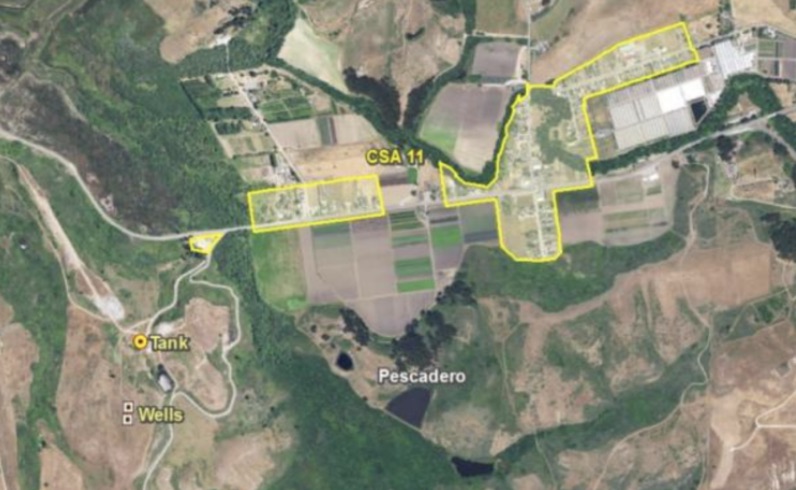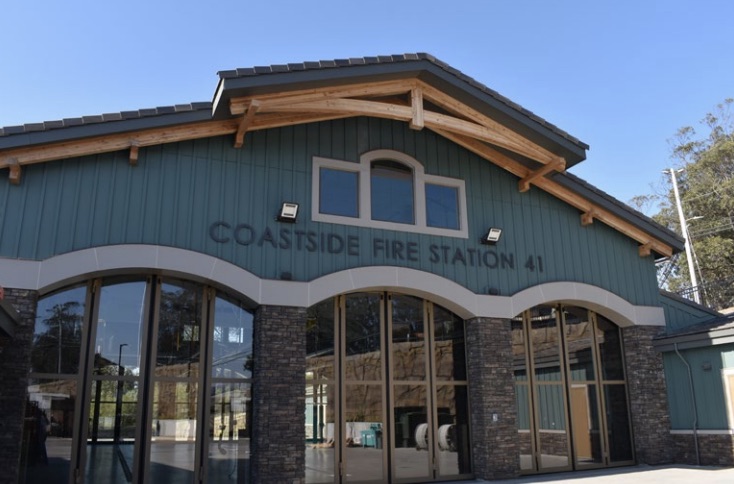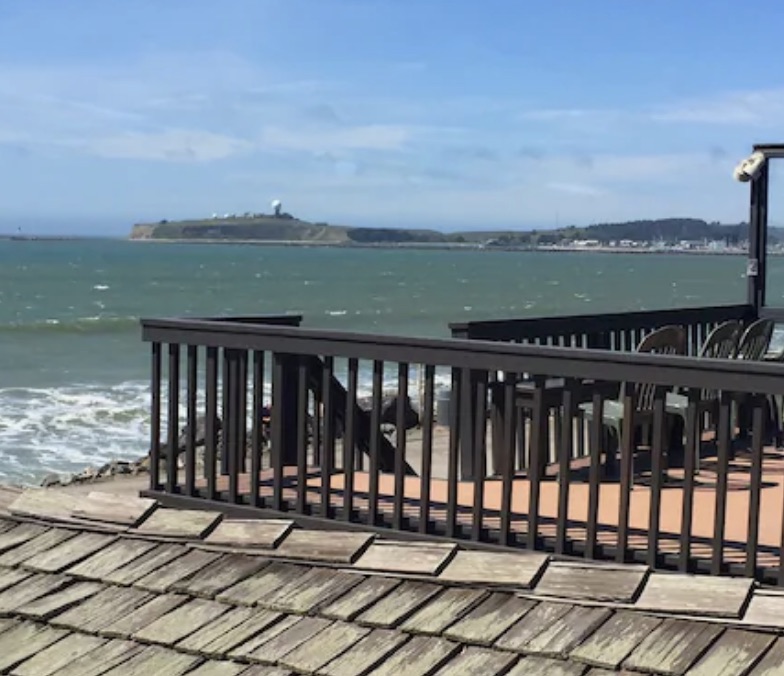|
Getting your Trinity Audio player ready...
|
VIDEO.
San Mateo County’s “Forgotten South Coast” includes historic farming, welcoming neighbors, and stunning beaches. Yet inadequate access to unpolluted water and limited housing expansion fuels inequities. Surprisingly, students don’t have clean water to drink at school, residents and business owners battle poor well water quality, and developers face sewage treatment challenges. Can’t we do better?
PowerPoint
[pdf-embedder url=”https://www.coastsidebuzz.com/wp-content/uploads/2021/04/2021-03-25-ES-event-slides-v05-low-res.pdf” title=”2021 03 25 E&S event slides v05 low res”]
Moderated by Irma Rodriguez Mitton of Sustainable Pescadero, the discussion featured leaders addressing challenges and solutions such as: Dave Damrosch, Dearborn Spring Water System (small scale water systems), Rachel Majors & Ari Ochoa, NuLeaf Tech (wastewater solutions), Kellyx Nelson, San Mateo RCD (water resources), Peter Haase, Sherwood Design Engineers (greywater systems), Brae Hunter and Supervisor Don Horsley, County of San Mateo (county engagement).
Co-sponsored by Sustainable Pescadero
Supported by Midpeninsula Regional Open Space District and Peninsula Clean Energy (PCE)
Thrive Alliance
WATER ACCESS GAPS IN SAN MATEO COUNTY: SOUTH COAST CHALLENGES AND EQUITABLE SOLUTIONS
Thursday, March 25, 2021, 3:30 PM, Zoom Recording & Slides
MEETING RECAP
On March 25, Thrive Alliance and Sustainable Pescadero joined forces to create a focused discussion on water issues in the South Coast region of San Mateo County. Over seventy local leaders and stakeholders from government, nonprofit, and business came together to discuss constraints, describe experiences, and explore possible solutions.
Pescadero specifically has faced challenges with potable drinking water; the high school has been without it for years. Although a County-sponsored project is in motion to provide clean water to students, persisting residential challenges remain. Further, the water supply ecosystem on the south coast is fragile and lacks critical infrastructure for development and growth.
PRE-MEETING SURVEY
In a pre-meeting survey with 25% responding, at least four individuals were concerned with each of these issues: safety of their drinking water quality, worried about nitrates or other contaminants and identified the cost of water filtration systems as a barrier. Eight said they don’t have a Plan B if their water source fails due to drought or other disasters.


More information on best practices for septic tank management and monitoring was also identified as a top concern. Top solutions that individuals would like to see implemented included improvement to old infrastructure/pipes and flexibility in regulations for more housing development.
EMPOWERING COMMUNITIES
Irma Rodriguez Mitton of Sustainable Pescadero started the conversation with an overview of the importance and complexity of water on the south coast and posed questions to be addressed.
What can we do to ensure that everyone on the coast doesn’t have to be worried about water quality or availability? And how do we empower all of our communities to work together?” asked Ms. Rodrigues Mitton
Building on previous efforts to investigate the current water landscape on the south coast, the audience convened to learn more. Kellyx Nelson, the Executive Director of San Mateo Resource Conservation District (RCD), updated the group with a landscape overview of the south coast watershed.
“Farm, fish, and people all rely on the same water sources,” she confirmed. “There is no water State water project, water utility, or irrigation district, and water is seasonal with limited streamflow threatening its supply,” she continued.
The RCD has done a lot of work on improvement and management in the south coast including water quality monitoring, water resource assessments, farm ponds, and irrigation efficiency projects.
SMALL DRINKING WATER SYSTEMS
Attendees then heard the perspective of local rural water system managers. Dave Damrosch the co-manager of Dearborn Water Systems in Pescadero described the infrastructure of the local solution.
“Ninety percent of the system infrastructure is above ground and is sensitive to natural disasters, but it’s very resilient,” he stated.
Periodic test results for bacteria and post-wildfire nitrate proved satisfactory. From another assessment, Damrosch reported the average use per person was about one-third of the national average.

Heather McAvoy, the Vice-Chair of the County Service Area 7 Customer Advisory Committee then discussed the parallels of Pescadero water issues to those in La Honda. In that locale, the top issues include lack of reliable water supply, and lack of regional solutions to persistent challenges of water availability, quality, and affordability. Likewise, aging infrastructure is in need of replacement and the cost of meeting state regulatory requirements is high. Furthermore, overhead costs negatively impact the affordability of this critical utility.
VIABLE SOLUTIONS
It’s clear that there are many challenges to the water supply and management on the south coast as well as ambiguity, making it difficult to find practical and implementable solutions. Yet, Peter Haase, the Principal Engineer at Sherwood Design Engineers, has been actively involved in the conversation in Pescadero for ten years and presented management strategies for water systems.
One innovative idea is to create a laundry facility in town with zero discharge by using a closed-loop system that captures, treats, and reuses the greywater. It would reduce water costs by 80% and would save energy costs by 60%. Another option he presented was to implement a new wastewater treatment system and recycled water storage tank close to the downtown district for irrigation supply.

Rachel Major and Ari Ochoa, the executive directors of NuLeaf Tech for compact ecosystems, then spoke about their off-grid water solutions. While many wastewater options benefit large civil engineering projects or corporations, the NuTree is a way for individuals to treat their wastewater onsite. One unit can treat 350 gallons of water a day using wetland bacteria that break down waste and less than 100 watts of energy.
“The units are fairly cost-conscious and are cost-competitive with septic tank systems,” said Ms. Major.
Although in their early technology phases, Nuleaf is one of the few companies focused on creating affordable solutions for small communities.
COUNTY & COMMUNITY PROGRESS
County Supervisor Don Horsley spoke to the current work that is being done in Pescadero. The lauded CSA 11 extension project is now in review and aims to provide water to the high school. A new groundwater well will be constructed that will drill deeper into the aquifer to expand storage.

It is a very complex project to adhere to regulatory standards and laws in the area (Local Coastal Program policies and rural-urban boundaries), and consequently, the expansion line will not be accessible by homes that it passes through. Further, the life expectancy of the well is roughly 100 years, yet County leaders are not convinced it is a permanent solution and are searching for additional improvements.
The meeting ended with an open community discussion between the audience and panelists. San Mateo RCD shared that they have partnered with Puente to provide free at-home water quality tests for residents who are concerned about water contamination. La Honda leaders acknowledged their experience with searching for a new stable source for water and navigating the complex solutions.
Additional questions about where to turn for help when concerned about water quality, specifically in East Palo Alto, were raised, and answers included seeking help from the Environmental Health department.
Joshua Hugg from Midpeninsula Open Space District explained how census tracts can sometimes misrepresent communities, and that Pescadero, with an average income at 80% of state median income, does not technically qualify under the traditional definition of a disadvantaged community. This causes barriers to funding. Josh described the active work with state legislators and southern California to get a new definition accepted and for it to be included in a Climate Bond that is underway.
NEXT STEPS?
There are many challenges with water supply and management in communities where systems are localized or privatized. Even with ongoing research and new solutions, there is much more to do. To address wide community concerns, it is vital to continue this conversation and bring together the right stakeholders to identify and implement effective solutions.
With water systems improvements in mind, having attended this March event or not, what next steps do you want to drive a more equitable and sustainable living on San Mateo County’s south coast?
ADDITIONAL INFORMATION
Please voice your desires by contacting Irma Rodriguez Mitton, Kellyx Nelson, and Supervisor Horsley’s office at the following contact info:
Irma Rodriguez Mitton- [email protected]
Kellyx Nelson- [email protected]
Don Horsley- [email protected]
ATTENDING ORGANIZATIONS:
Business – Coastside Buzz, Dearborn Spring Water System, Fruition Sustainability Solutions LLC, Gibson, Dunn & Crutcher LLP, Golden Gate Sotheby’s International Realty, La Honda Vista Water Company, MNS Engineers, Nuleaf Tech Inc, Optimal Business Consulting Services, LLC, San Mateo County Water Resilience Initiative, Sherwood Design Engineers
Government – California Public Utility Commission, California State Assembly – Marc Berman’s Office, California State Senate – Josh Becker’s Office, City of Brisbane, La Honda-Pescadero Unified School District, Menlo Park Fire District, Midpeninsula Regional Open Space District, North Fair Oaks Community Council, San Mateo Resource Conservation District, SMC Board of Supervisor – Don Horsley’s Office, SMC County Manager Office, SMC Harbor District Commission, SMC Office of Sustainability, SMCDCC Farmworker Affairs Committee
Nonprofit & Community – CASE4GOOD, CityTrees, Climate Resilient Communities, CSA7 Customer Advisory Committee, Extinction Rebellion, Leadership Council San Mateo County, League of Women Voters Of North & Central San Mateo County, League of Women Voters of South San Mateo County, Pacifica Housing 4 All, PARCA, Peninsula Open Space Trust, Puente de la Costa Sur, Sacred Heart Schools, San Gregorio Environmental Resource Center, Silicon Valley Urban Debate League, Sustainable Pescadero, Sustainable Silicon Valley, The Grove Foundation, Thrive Alliance
SPEAKER WEBSITE LINKS:
LINKS TO ADDITIONAL RESOURCES
-
Silicon Valley Community Foundation- South Coast Report
-
Dig Deep & US Water Alliance- Closing the Water Access Gap in the United States
-
SMC Hazard Mitigation Plans– take the 2021 survey, attend Sustainable Pescadero meetings





